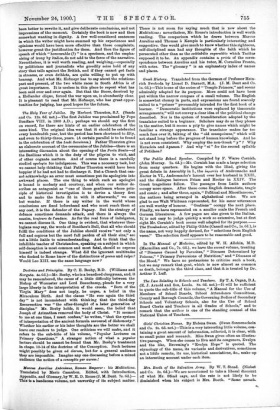Doctrine and Principles. By C. E. Beeby, B.D. (Williams and
Norgate. 4s. 6d.)—Mr. Beeby, who is a beneficed clergyman, and, it may be remembered, the cause of a little difficulty between the Bishop of Worcester and Lord Beauchamp, pleads for a very large liberty in the interpretation of the creeds. "Born of the Virgin Mary" does not imply, he urges, a belief in the Miraculous Birth. And the clause "He rose again the third day" is not inconsistent with thinking that the third-clay Resurrection was "the after-thought of a later generation of disciples." Mr. Beeby holds, it would seem, the belief that Joseph of Arimathea removed the body of Christ. "It seemed to me at one time, I must confess," he writes, "that the system of interpretation of the ancient formula savoured of dishonesty." Whether his earlier or his later thoughts are the better we shall leave our readers to judge. One criticism we will make, and it refers to the sub-title of his volume, "Popular Lectures on Primary Questions." A stranger notion of what a popular lecture should be cannot be found than Mr. Beeby's treatment in chaps. 13-14 of the doctrine of the Conception. Such lectures might possibly be given ad clerum, but for a general audience they are impossible. Imagine any one discussing before a mixed audience the notion of a conceptio per aurem !










































 Previous page
Previous page